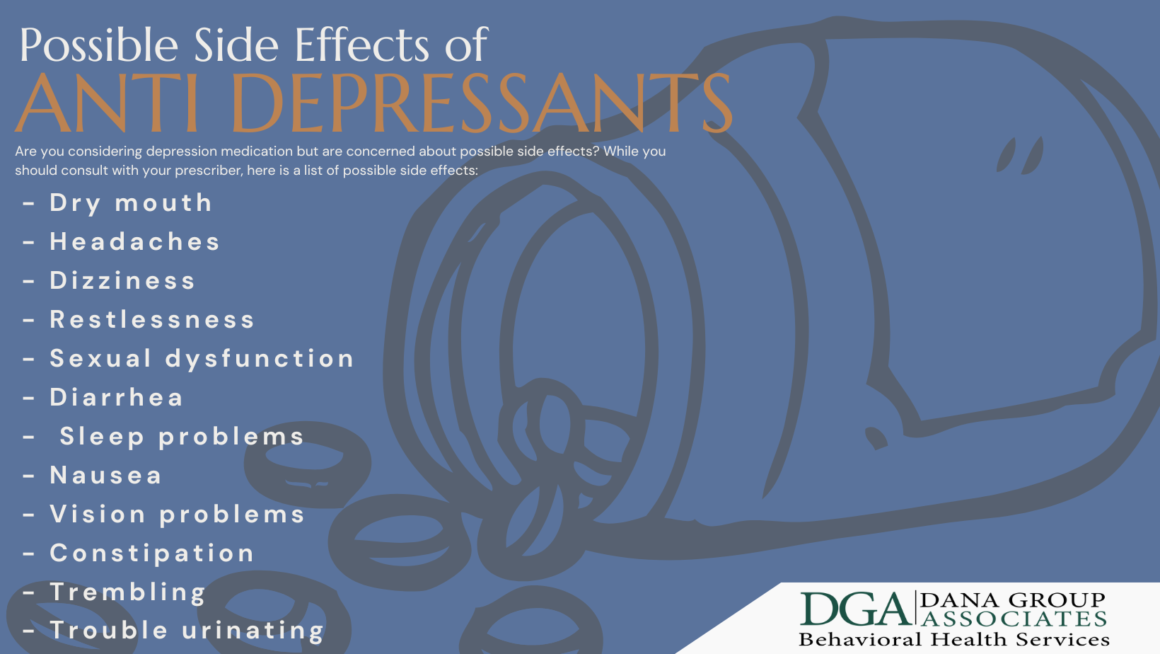If it seems that more people are taking medication for depression these days, it might be because they are. According to CDC statistics, 10.6% of adults took antidepressants between 2009-2010, while 13.8% of adults took antidepressants from 2017-2018. So does medication help depression? Here’s what you need to know.
Are you looking for help with depression? Schedule an appointment with Dana Behavioral Health to explore your treatment options.
How Antidepressants Work
You might have heard that depression and some other mental health conditions are caused by chemical imbalances in the brain. Although it really isn’t that simple, certain natural chemicals found in your brain can get out of balance, causing any of the symptoms of depression.
So, how do antidepressants work? The explanation starts with the brain chemicals, such as serotonin and others. These chemicals, called neurotransmitters, carry messages between nerve cells in the brain. However, if the neurotransmitters are out of balance, the messages can’t be properly transmitted. What antidepressants do is make more of these chemicals available.
Are Antidepressants Effective?
When you ask, “Does medication help depression?” what you want to know is whether they are helpful in reducing depression symptoms. In other words, are antidepressants effective? Much research has been done to determine the effectiveness of various depression medications.
One thing that researchers have discovered is that the more severe the depression is, the more effectively depression medications reduce the symptoms. Therefore, if you only have mild depression, you might not notice much difference between taking antidepressants and not taking them. On the other hand, if you have very severe depression, you’re more likely to see a significant improvement after you start taking antidepressants.
Things to Consider Before Taking Antidepressants
Taking medication for depression deserves some serious thought. By taking antidepressants, you are making changes to your body and your brain. Therefore, it makes sense to think about whether those changes will bring relief or more problems. Consider the following questions before you begin taking depression medications. Your mental health provider can help you sort out your options.
Are you considering taking depression meds and want to know more? Contact us at Dana Behavioral Health to find your answers.
What Are the Side Effects of Depression Medications?

Source: DocBook
Each depression medication has its own list of side effects. However, there are several side effects that are common to many antidepressants. Here are a few of the typical side effects of depression medications.
- Dry mouth
- Headaches
- Dizziness
- Restlessness
- Sexual dysfunction
- Diarrhea
- Sleep problems
- Nausea
- Vision problems
- Constipation
- Trembling
- Trouble urinating
Remember, some of these problems can be caused by depression itself. In addition, not everyone experiences side effects. Only about half of the people who take depression medications have any side effects at all. What’s more, many people have side effects when they first start the medication, and those effects diminish after a few weeks.
Have You Taken Depression Meds Before?
If you have taken antidepressants before, you will have your experience to guide you – to a point. Certainly, if antidepressants have helped you before, there’s a good chance they will help again. But if you haven’t had good results with antidepressants before, it doesn’t mean that depression meds won’t help now. You might simply need a different medication or to add other components, like therapy, to your depression treatment plan.
Will There Be Other Components of Your Treatment?
Antidepressants alone can be helpful for some people. However, for many people, therapy is an important part of treatment. As long as you take depression medications, you may have relief from symptoms.
Therapy is different. In therapy, you can deal with issues, put them behind you, and learn new ways of thinking and behaving. While antidepressant meds might work as long as you take them, the work you do in therapy can continue to benefit you for the rest of your life.
For many people, the ideal depression treatment plan includes both antidepressants and therapy. The best way to determine whether to add therapy is to talk it over with a mental health professional. They can explain the benefits you would receive from meds and/or therapy and make a recommendation for you as a unique individual.
Would you like to discuss your depression with a professional? Schedule an appointment at Dana Behavioral Health.
Which Antidepressants Are Best?
There are many different types of antidepressants, with several different options within each type. Here are the main types of depression medications your doctor might suggest.
- SSRIs – selective serotonin reuptake inhibitors
- SNRIs – serotonin-noradrenaline reuptake inhibitors
- Tricyclic antidepressants
- MAOIs – monoamine oxidase inhibitors
- Atypical antidepressants, such as bupropion, trazodone, and mirtazapine
So then, how are you to decide which antidepressant is best? How does your doctor decide? Since every individual is different, no single antidepressant will benefit everyone. The good news is that you don’t have to find the best antidepressant for you alone. Your doctor is there to help as a part of their medication management services.
Your doctor likely has abundant experience with prescribing many different antidepressants. Based on their knowledge and experience, they will suggest a medication to try. Then, if there is a problem with side effects or if you aren’t getting any relief, the doctor might offer you a different medication or add another one that will work with the first.
How Long Should You Take Antidepressants?
Antidepressants can begin to work after one to two weeks. However, you usually need to keep taking them for longer to see the full benefits. Some people who have depression take antidepressants for one to two years. Those with chronic depression might need to continue with depression medications longer. Why? The reason is that antidepressants can help prevent relapses.
Does Medication Help Depression?
The answer to “Does medication help depression” is a difficult one to answer. It depends on many factors.
- The severity of your depression
- Whether you have therapy at the same time
- Your unique physical makeup
- Your overall health
- Which depression medication you take
- What the dosage is
- Whether you take the medications as prescribed
- How long you take the medication
Medication may or may not help you. It doesn’t help everyone, but some people find it a key component of their depression treatment plan. Understanding the risks and benefits can prepare you for a discussion with your psychiatrist. Together, you can determine the best way to approach your depression symptoms.
Depression Treatment in Massachusetts
At Dana Behavioral Health, we provide behavioral health services, including both therapy and medication management. Our therapists offer individual, family therapy, and music therapy. We also conduct psychological testing to determine the best ways to help you.
Our providers can help you understand what you need to know before starting a medication or therapy. We have offices in Needham, Norwell, and Hanover, MA, and we invite you to contact us by phone or through our website. We look forward to helping you thrive.
Is it time to think about your mental well-being? Contact us at Dana Behavioral Health for the help you need.
